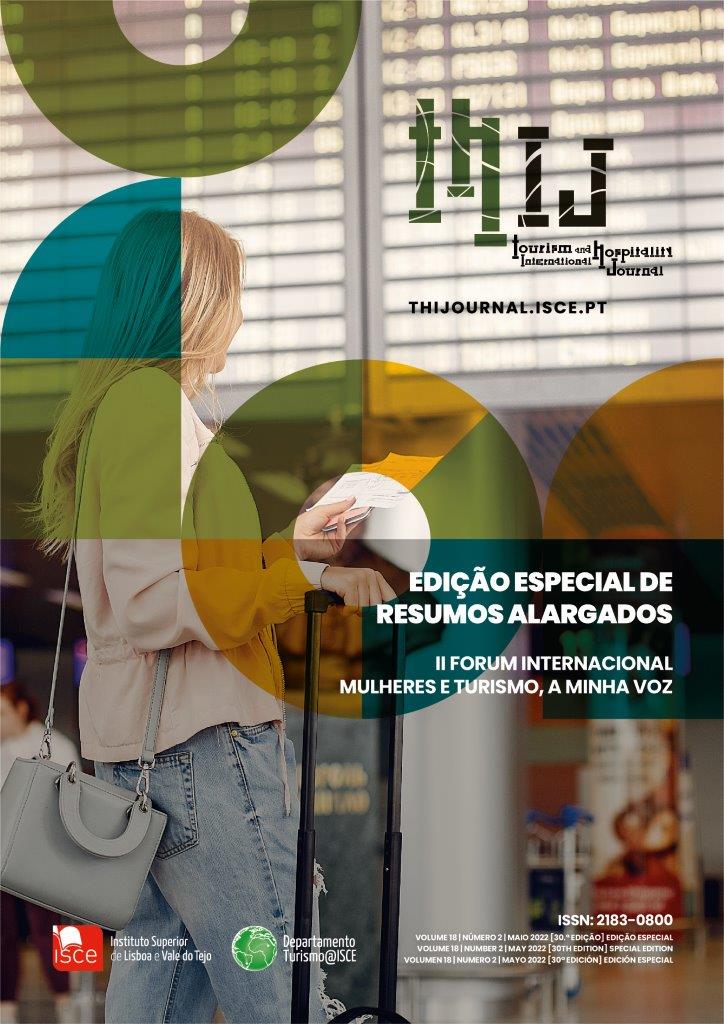Turismo Humanizado – as Pessoas no centro
DOI:
https://doi.org/10.57883/thij18(2)2022.31106Resumo
Gerir pessoas, significa conhecê-las primeiro que tudo. Van Scotter e Culligan (2003) defendem a pesquisa como a compreensão de um fenómeno, pois pode levar, a longo prazo, a melhorias na gestão, ao desenvolvimento de melhores práticas operacionais ou estratégias mais competitivas. A noção de que o desenvolvimento organizacional e o desempenho das empresas do serviço de hospitalidade dependem das suposições dos trabalhadores, tem recebido uma aceitação crescente na literatura (Lord e Emrich, 2000; Schneider et al., 2005). Para ser capaz de reforçar, desafiar ou mudar as premissas básicas dos profissionais, os gestores hoteleiros precisam ter um conhecimento claro e uma descrição precisa dos pressupostos básicos do trabalhador (dimensões e hierarquias) e os seus padrões (correlações entre dimensões).
Referências
Abou-Shouk M.A., Mannaa M.T. e Elbaz A.M. (2021). Women's empowerment and tourism development: A cross-country study. Tourism Management Perspectives, 37. Doi: 10.1016/j.tmp.2020.100782
Chen J., Ying H., Zhou M. (2021). Thwarted psychological needs: the negative impact of customer mistreatment on service employees and the moderating role of empowerment HRM practices. Personnel Review. Doi: 10.1108/PR-06-2020-0489
Clark R., Hartline M., Jones K. (2009). The Effects of Leadership Style on Hotel Employees’ Commitment to Service Quality. Hotel Management, 50, 2, 209-231. Doi: 10.1177/1938965508315371
Dastmalchian A., Ng I. (2000). The interplay between organizational and national cultures: a comparison of organizational practices in Canada and South Korea using the Competing Values Framework – ResearchGate. The International Journal of Human Resource Management, 388-412. Doi: 10.1080/095851900339927
Freund D. e Hernandez-Maskivker G.(2021). Women managers in tourism: Associations for building a sustainable world. Tourism Management Perspectives, 38. Doi: 10.1016/j.tmp.2021.100820
Gebbels M.,Gao X. e Cai W. (2020). Let’s not just “talk” about it: reflections on women’s career development in hospitality. International Journal of Contemporary Hospitality Management, 32, 11, 3623 - 3643. Doi: 10.1108/IJCHM-05-2020-0385
He Y., Li W., Lai K., (2011). Service climate, employee commitment and customer satisfaction. International Journal of Contemporary Hospitality Management, 23, 5, 592 – 607. Doi:10.1108/09596111111143359
Kandampully, J. (2006). The new customer-centred business model for the hospitality industry. International Journal of Contemporary Hospitality Management 18(3),173-187. Doi: 10.1108/09596110610658599
Kichuk, A. (2017). Understanding Talent Management in the hotel sector: employees’ narratives of personal career development. Bournemouth University.
Kloutsiniotis P., Mihail D. (2020). The effects of high performance work systems in employees’ service-oriented OCB. International Journal of Hospitality Management, 90. Doi: 10.1016/j.ijhm.2020.102610
Kyriakidou, O., Gore, J. (2005). Learning by example: Benchmarking organizational culture in hospitality, tourism and leisure SMEs. Benchmarking: An International Journal, 12, 3, 192-206. Doi: 10.1108/14635770510600320
Lee H. et al (2019). Effects of Human Resource Management Systems on Employee Proactivity and Group Innovation. Journal of Management, 45, 2, 819 –846. Doi: 10.1177/0149206316680029
Liaw Y., Chi N., Chuang A. (2010). Examining the Mechanisms Linking Transformational Leadership, Employee Customer Orientation, and Service Performance: The Mediating Roles of Perceived Supervisor and Coworker Support. J Bus Psychol, 25, 477–492. Doi:10.1007/s10869-009-9145-x
Lord, R.G., Emrich, C.G. (2000). Thinking outside the box by looking inside the box: Extending the cognitive revolution in leadership research. The Leadership Quarterly, 11, pp. 551-579
Mandal S., Kavala H., Potlapally G. (2020). Does Organizational Culture Matter for Shaping up Hotel’s Responsiveness to Customer’s Demand? An Empirical Investigation. International Journal of Hospitality & Tourism Administration. Doi: 10.1080/15256480.2020.1727811
Mishra S., Singh S., Tripathy P. (2020). Linkage Between Employee Satisfaction and Employee Performance: A Case in Banking Industry. Global Business Review, 1–11. Doi: 10.1177/0972150920970351
Mooney S. (2014). How the Intersections of Age, Gender, Ethnicity and Class Influence the Longevity of a Hospitality Career in New Zealand. Auckland University of Technology.
Mwaura G., Sutton J., Roberts D. (1998). Corporate and national culture ‐ an irreconcilable dilemma for the hospitality manager? International Journal of Contemporary Hospitality Management, 10, 6, 212-220. Doi: 10.1108/09596119810232211
Nazarian A., Atkinson P. e Foroudi P. (2017). Influence of national culture and balanced organizational culture on the hotel industry’s performance. International Journal of Hospitality Management, 63, 22-32. Doi: 10.1016/j.ijhm.2017.01.003
Padrón-Díaz de León, EA, Palafox-Muñoz, A., Vargas-Martínez, EE. (2019). Organizational culture and innovation within the hotel sector: State of knowledge. Revista Venezolana de Gerencia, 24 (85).
Rajib S., Dhar L. (2014). Effects of stress, LMX and perceived organizational support on service quality: Mediating effects of organizational commitment. Journal of Hospitality and Tourism Management, 21, 64-75. Doi: 10.1016/j.jhtm.2014.07.002
Ríos, Re., Molina, Lal. (2018). The “uses and customs” of the state of Oaxaca in the tourist companies of Bahías de Huatulco. A characterization of Hofstede's organizational culture. Investigaciones Turisticas Acesso, 15, 128-146. Doi: 10.14198 / INTURI2018.15.06
Schneider B. et al (2005). Understanding Organization-Customer Links in Service Settings. Academy of Management Journal, 48, 6. Doi: 10.5465/amj.2005.19573107
Surucu L., Sesen H. (2019). Entrepreneurial Behaviors in the Hospitality Industry: Human Resources Management Practices and Leader Member Exchange Role. Revista de Cercetare si Interventie Sociala, 66, 114-132. Doi: 10.33788/rcis.66.8
Teng H. (2019). Job crafting and customer service behaviors in the hospitality industry: Mediating effect of job passion. International Journal of Hospitality Management, 81, 34-42. Doi: 10.1016/j.ijhm.2019.03.013
Van Scotter, Culligan (2003). The Value of Theoretical Research and Applied Research for the Hospitality Industry. Cornell University, 44 (2): 14 – 27.
Zhang J. e Zhang Y. (2021). A qualitative comparative analysis of tourism and gender equality in emerging economies. Journal of Hospitality and Tourism Management, 46. Doi: 10.1016/j.jhtm.2021.01.009
Downloads
Publicado
Como Citar
Edição
Secção
Licença
Direitos de Autor (c) 2021 This work is licensed under a Creative Commons - Attribution 4.0 International (CC BY 4.0)

Este trabalho encontra-se publicado com a Licença Internacional Creative Commons Atribuição 4.0.
Este trabalho encontra-se publicado com a Licença Internacional Creative Commons Atribuição 4.0.






